Kevin Clarke
Operetta Research Center
13 April, 2019
Kálmán’s Faschingsfee started her phenomenal career abroad, to be exact: in Budapest and New York City. First the show premiered in February 1915 as Zsuzsi kisasszony (Miss Susi) in Hungarian at the Vigszinház, then in English as Miss Springtime in September 1916 at the New Amsterdam Theatre, with a book by Guy Bolton and lyrics by P. G. Wodehouse. It was one of Kálmán’s greatest Broadway successes, running for 224 performances. Jerome Kern added extra music. With such oversea fame, it was obvious that Vienna would get a German language Faschingsfee, in September 1917, which was arranged by Alfred Maria Willner and Rudolf Österreicher, set in carnival times in Munich: a Bavarian topsy-turvy about young Countess Alexandra who escapes her imminent engagement to an elderly duke by rushing off to a student café, incognito, where a starving young painter named Victor falls for the anonymous beauty. He paints her as his carnival fairy. Of course things get rather complicated once it becomes known who she really is and when her fiancée sees the ‘indecent’ painting. In the German language theatre world it was not the Viennese production, however, that made a lasting impression, it was in Berlin in September 1918 that the real Faschingsfee sensation occurred when Fritzi Massary took on the role of Countess Alexandra at the Metropoltheater, towards the end of World War 1, as a kind of End Game showing the collapse of the ‘old aristocratic system.’
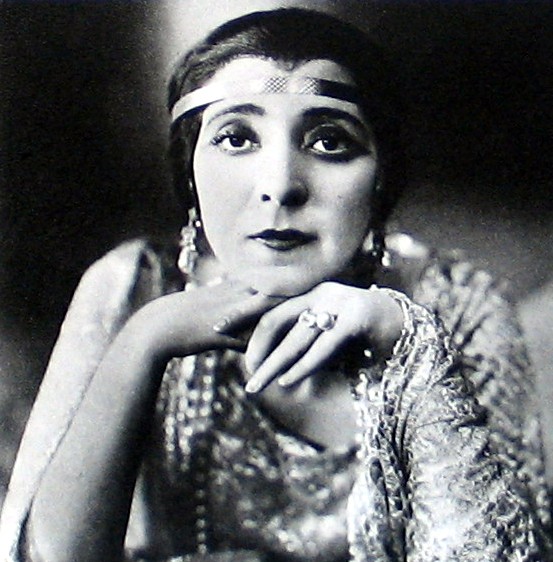
The one and only Fritzi Massary.
There are quite a few memorable recordings. Kálmán himself conducted the glorious Miss Spingtime overture in 1940 with the NBC Symphony Orchestra in New York; it’s available on CD and probably the most ecstatic version imaginable. Also from the United States come various vocal medleys, e.g. with the Victor Light Opera and The Serenaders, both part of the CD compilation Kálmán on Broadway. The Ohio Light Opera brought forth a full cast album, which suffers from the usual Ohio dreariness – but you get the full German score (Berlin version) translated back into English. And some of the singers are rather good, dreary or not.

The 2012 recording of “Faschingsfee” as “Carnival Fairy” from the Ohio Light Opera. (Photo: Albany Records)
There is a complete ORF radio broadcast conducted by Max Schönherr, with Gerda Scheyrer and Fred Liewehr, but it hasn’t come out on CD. What did come out, though, is a 1995 Cologne recording, conducted with staggering verve by Peter Falk. It has Melanie Holliday as Countess Alexandra who brings great charm and ease to the role, as does Eberhard Büchner as Victor. They, as well as the remaining ensemble, sing with that typical ‘tv operetta style’ that sounds very dated today, to my ears at least, but that still works in its own way. That the recording (17 tracks) is a triumph is mostly due to the Kölner Rundfunkorchester and local Händel choir, they move matters along with exquisite energy, thanks to Peter Falk. He is otherwise not a noted Kálmán conductor, but after listening to his Faschingsfee you wish he’d done more recordings of this repertoire. There is absolutely no linking dialogue in this CD, so you need to guess the story.
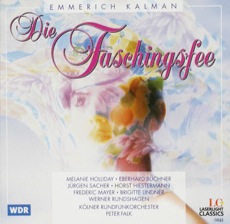
The “Faschingsfee” recording conducted by Peter Falk.
And now, 20 years later, there is another full German cast recording, this time live from Munich with the Gärtnerplatz theater ensemble, headed by Camille Schnoor as Alexandra and Daniel Prohaska as Victor; Michael Brandstätter conducts. It’s a new “Fassung” created by intendant and stage director Josef E. Köpplinger, that emphasizes the war background with food rationing and soldiers coming back from the front lines, eager to forget and have fun. It also emphasizes the high ranking military command personnel as diabolic men who threw Germany into ruin, for their own vanity. So the End Game aspect is still present, and you get glimpses of it in the dialogue.
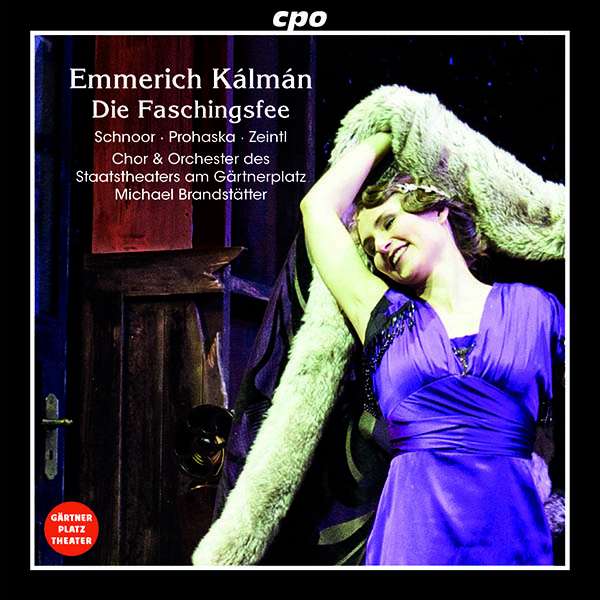
The cpo release of Kálmáns “Die Faschingsfee” from Munichs Gärtnerplatz Theater ensemble.
You’d think that performing this Munich based story in Munich would be a natural ‘win-win’ situation. On stage it was, by all accounts. (To read John Goves’ review, click here.) On record, the Bavarian accents are somewhat unevenly distributed and don’t come across naturally. Which makes for some odd dialect mixing among the students and aristocrats. But that, in the end, would be only a minor quibble if the rest were boisterous fun. Sadly, it isn’t.
Mr. Brandstätter is no Peter Falk, he rarely gets the music off the ground with a bang, e.g. in the many dance duets where Kálmán throws you off the horse, metaphorically speaking, with his drive and wild syncopations. When the slow waltzes come along – among them a languorous humming waltz – the conductor never creates that dark glow that such a sensuous situation needs. In the end, he and the Orchestra of the Staatstheater am Gärtnerplatz deliver serviceable accompaniment, and that’s it. They leave out the big overture, not included in the German score, but included on the Cologne recording. (And nearly as good, there, as Kálmán’s own 1940 version.)
When it comes to the role of Alexandra, seducing the poor painter, pretending she’s just a simple lass, Camille Schnoor is no match for Fritzi Massary. Neither was Melanie Holliday, for that matter, but at least she had charisma and an endearing light musical comedy style. Miss Schnoor sings the role with grand opera tones and a slightly unpleasant top range. Her vocal waltzing doesn’t have a flirtatious note anywhere, and her show stopping quick step (“Lieber Himmelsvater”) will not make you believe that this young lady would throw all caution into the wind to enjoy a night of abandon. So in a way, this new Faschingsfee is lacking a center – the star-turn that Miss Massary once gave us, the sharp emotional contrasts, the abandon, and the ironic playfullness.
Daniel Prohaska is more engaging than his partner, in a sympathetic kind of way, but he’s still comparatively stiff in the dialogue and never the hot blooded and temperamental artist madly in love with a lady he only just met, yet is willing to risk and lose everything for. His serenade in ¾ time, “Komm, du wundersam süße Nacht,” is unlikely to give anyone wet underpants. And his declaration “Küssen muss sie können, dass die Lippen brennen” is lacking any believable ardor. It’s a noticably restrained interpretation, while carnival is in full swing all around, and while death and the end of war loom darkly in the background.
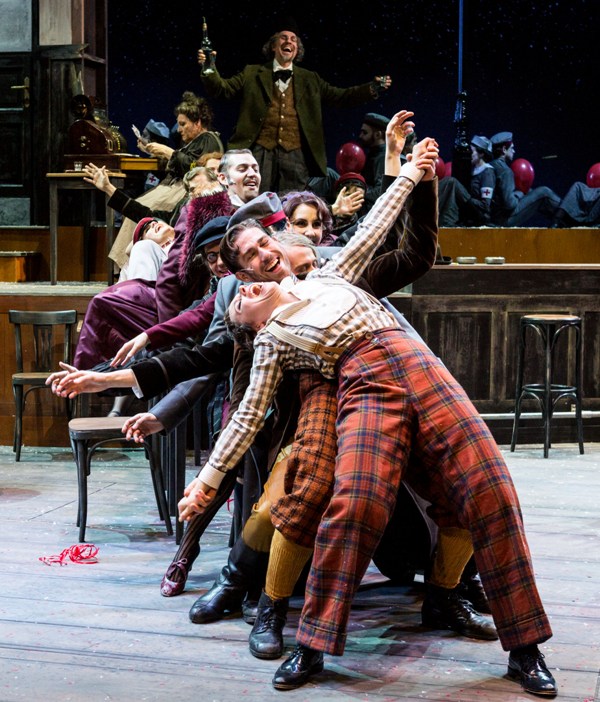
The dance ensemble in “Faschingsfee” in Munich. (Photo: Marie-Laure Briane)
The other roles are adequately cast, it’s tricky to differentiate and understand who’s who on the recording. They all sound similar. Certainly the comedians – Nadine Zeintl as Lori and Simon Schnorr as Hubert – come across very grandly, almost as if they’re trying to outshine Alexandra and Victor in terms of pathos. Which doesn’t work too well with the music they are given. I personally would have preferred more comic character voices here.
As Count Mereditt, who thinks he can grab any woman by the pussy, as Donald Trump would put it, and as he says in slightly more elegant words in the act 1 finale, you get Maximilian Mayer. He possesses a slim and elegant tenor voice, and a marvelous stage presence, but he sounds far too nice for a character who nearly rapes the heroine and gets challenged to a duel. More nastiness would have worked better here. Or, alternatively, Mr. Mayer could have played Victor. He’s certainly ready for the more romantic lead roles.
All in all, I believe this entire stage performance would work better as a DVD instead of a CD, because I assume Camille Schnoor and Daniel Prohaska, and all the others, make a better effect visually than they do in terms of pure singing.
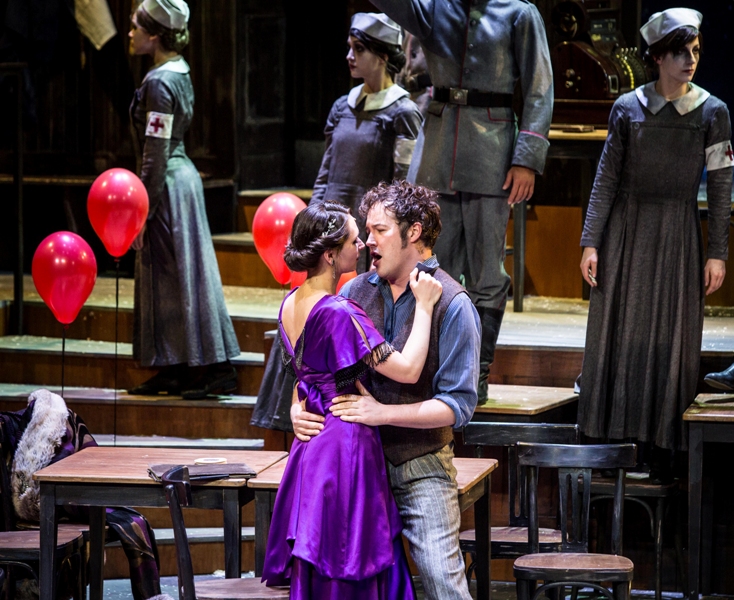
Camille Schnoor (as Fürstin Alexandra Maria) and Daniel Prohaska (as Viktor Ronai) in “Faschingsfee.” (Photo: Marie-Laure Briane)
As a musical experience, it’s annoying that so much music is cut, especially the big hits don’t get the repeats that Kálmán’s score actually demands. And that’s a shame. The extensive dialogue in between is helpful for understanding the plot, but since it’s not the complete dialogue and the actors are at times difficult to keep apart, it’s also confusing (and a bit boring) to listen in. None of the singers is blessed with any special stage acting abilities, so the dialogue only works to a certain point anyway. It’s a shame the dialogue isn’t given a better rendition because the story is actually pretty thrilling, especially in times of #metoo and especially with regard to Count Mereditt.
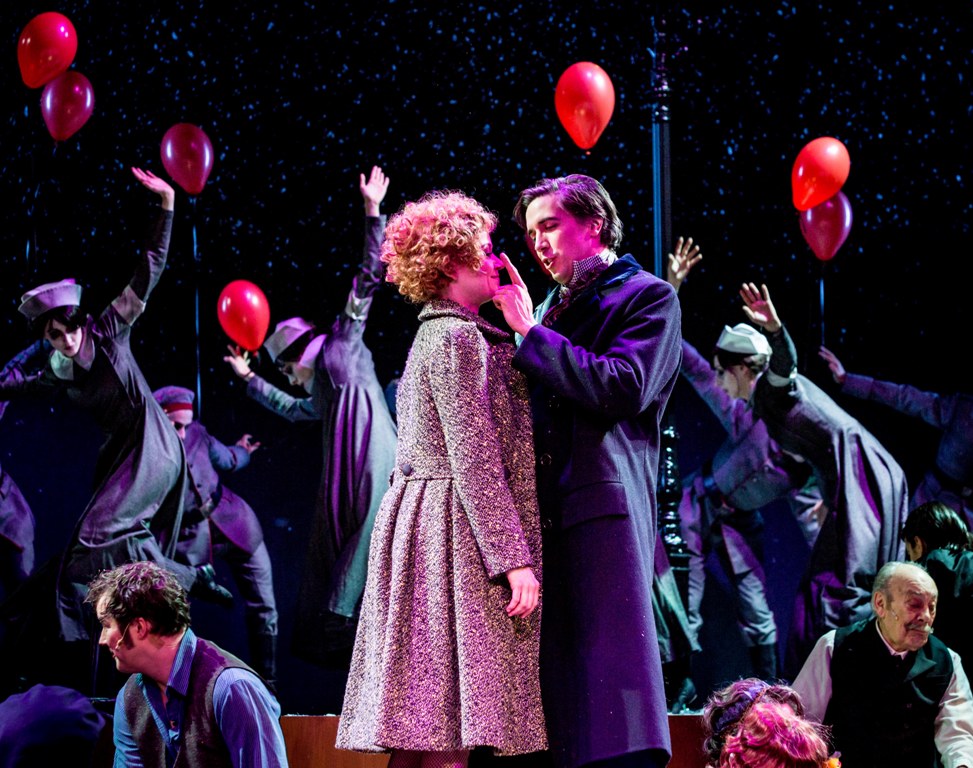
Nadine Zeintl (as Lori Aschenbrenner, Choristin), Simon Schnorr (as Baron Hubert von Mützelberg), and ensemble in “Faschungsfee.” (Photo: Marie-Laure Briane)
Compared with the recent cpo release of Ein Herbstmanöver, which is explosive and dazzling on so many levels, this much more mature score with its many hits on the level of Kálmán’s ‘top 10’ is too lackluster to make a serious impact. But maybe the Gärtnerplatz Theater is not the venue where one should look for operetta-with-impact.

The Truesound Transfers edition of “Faschingsfee” includes 12 numbers from the show, sung by Fritzi Massary.
A place where you can look for it is Truesound Transfers which released 12 Faschingsfee tracks with Fritzi Massary and Eugen Rex, recorded in 1917. They give a demonstration of what this music can sound like and should sound like. The recordings are masterfully restored and a joy to listen to. They come across with such vitality and ease that you wonder: why is it so difficult for today’s operetta people to get that ‘tone’ right?

The Munich production, which I saw and reviewed for ORCA was delightful and great fun. However, better still was the more recent staging at Krefeld/Monchengladbach. The Peter Falk CD has a great deal of energy – and is much cheaper than the CPO CDs!!